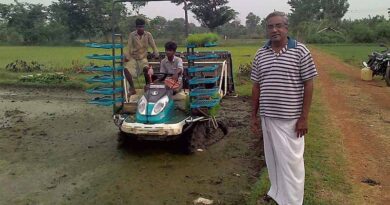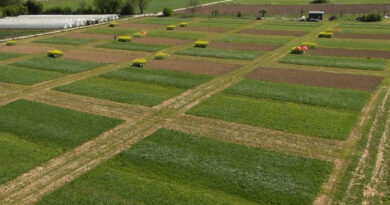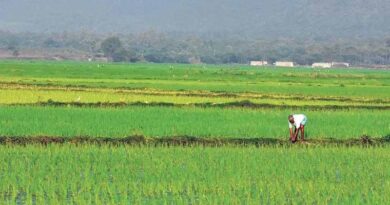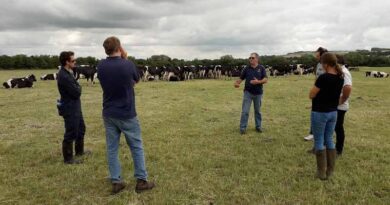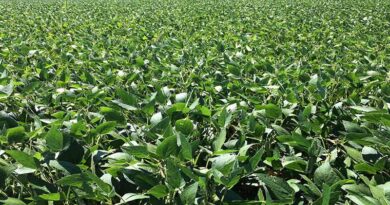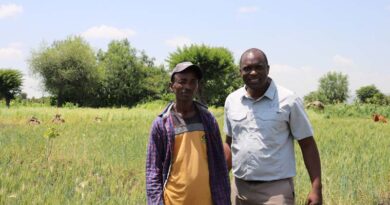Finding the Leaders in Climate-Positive Agriculture
01 January 2024, New Delhi: In a world marked by environmental challenges, the importance of sustainable agriculture has never been more crucial. As we face the consequences of climate change and strive for a greener future, it is clear that sustainable practices are the need of the hour.
We at Krishak Jagat spoke with Ravichandran Vanchinatha Iyer, a farmer from Tamil Nadu, India. Ravichandran stands as a testament to the power of eco-friendly farming practices. His dedication to cultivating crops like rice, cotton, pulses, and sugarcane while minimizing his environmental footprint has earned him a distinguished position within Corteva’s Climate Positive Leaders Program.
1. Can you share the journey that led you to go with sustainable agriculture?
In 1985, I embarked on a path toward sustainable agriculture, even though I held a graduation degree in Mathematics. I was motivated by the belief that agriculture presented distinctive challenges and financial prospects while also offering an avenue for me to make a positive impact on society. My objective was simple: to assist resource-challenged, small-scale, and disadvantaged farmers in enhancing their crop yields and livelihoods through the judicious application of technology.
My path toward sustainability began with a profound realization that farming needed to evolve beyond simply maximizing yields; it needed to consider the long-term well-being of the land and the environment. To address this, I initiated a transition towards eco-friendly practices, with a primary focus on rice cultivation. This transformative journey involved the adoption of drip irrigation techniques, the optimization of fertilizer utilization, the implementation of intercropping strategies, and the careful selection of rice varieties that were ideally suited to our local conditions. Through these practices, I was able to achieve a 50 percent reduction in water consumption while also reducing methane emissions, my carbon footprint, and my water footprint.
When I opted for farming as my career in 1986, I wondered why so much water is stagnated in the rice fields. I realized that by flooding and inundating the rice field weeds could be suppressed. During that time there weren’t many selective broad-spectrum weedicides to control weeds in rice. Weeds in rice fields being C4 plants, they suppressed rice plants. The only option was hand weeding which is prohibitively expensive. I noticed in rice fields where we impound water to suppress weeds, the tillering ability of the rice is compromised. To achieve the twin objects of enhancing the tillering capability of rice and controlling weeds, I adopted the alternate wetting and drying method (AWD), System of Rice Intensification (SRI), and Drip Irrigation, and by using selective broad-spectrum herbicide. To date, I have been following the right combination of technology, agronomic practices, and judicious use of herbicides and enhance production and productivity.
2. What are the key environmental challenges you’ve encountered in your region, and how has sustainable agriculture helped address or mitigate these challenges?
In Tamil Nadu, where my farm is located, we face several environmental challenges that impact agriculture. Water scarcity is a significant issue, and there’s a pressing need to reduce methane emissions, given its contribution to climate change. Furthermore, the availability of arable land is shrinking due to urbanization and non-agricultural land use.
To tackle these challenges, I turned to sustainable agriculture practices. Drip irrigation has been a game-changer, allowing me to use water more efficiently. We also improved our fertilizer application methods and strategically selected rice varieties that were not only high-yielding but also more environmentally friendly. The result was a remarkable 50 percent reduction in water consumption, a reduction in methane emissions, and a smaller carbon footprint.
Additionally, I adopted a zero-plastic waste/zero pollution approach, composting vegetative waste and using it as mulch, which not only enriched the soil but also reduced the need for urea fertilizers. Practices like crop rotation and forestry projects have further enhanced soil health and supported carbon sequestration
I adopt a few practices to convert farm waste into wealth. I exchange the straw for cow dung from the cattle owners. I convert them into compost by using microorganisms. to hasten the composition process I shred the farm wastes into small pieces. Sometimes I spread the shredded farm wastes in the field as mulch.
While composting the main challenge is transporting the farm wastes to the compost pits. To address this problem, I compost the residues in the same field where they are generated by forming the compost pit in a suitable place within the field. I then use the composted manure for the next crop.
3. Corteva’s Climate Positive Leaders Program recognizes your contributions. Can you tell us more about your involvement in this program?
I am deeply grateful to be recognized by Corteva’s Climate Positive Leaders Program. It’s a tremendous honor to be acknowledged globally for my efforts. However, I don’t think it is just about personal recognition for me, but a chance to share my experiences and insights with fellow farmers around the world. As a global leader in this program, I’ve been given a platform to discuss the climate-positive practices I’ve implemented on my farm and how they’ve contributed to both the productivity of my land and the well-being of our environment.
We are living in a time where technological advancements are happening every minute. Being recognized by Corteva will give me a lifetime membership and training from the Global Farmer Network. This will allow me not only to continue refining my sustainable farming practices but also to engage in broader conversations about the agriculture industry with policymakers, government officials, and other key stakeholders. I’ve had the privilege to interact with other like-minded farmers who are equally committed to climate-positive agriculture. It’s encouraged me to explore and adopt even more innovative systems and approaches that not only support my productivity goals but also protect natural resources.
Moreover, I see it as a responsibility to pay it forward. By sharing my experiences as a Climate Positive Leader, I hope to inspire and guide other farmers in adopting similar practices. Together, we can make agriculture not only productive and profitable but also environmentally beneficial and equitable.
4. How do you engage with and educate other farmers in your region about the benefits of sustainable farming practices?
Engaging and educating fellow farmers about sustainable farming practices is a crucial part of my mission. I utilize various channels to reach out to the farming community, both locally and globally. One of the primary ways I engage with other farmers is through agriculture forums and social media. I actively share my experiences and insights regarding sustainable farming practices, with a particular focus on eco-friendly rice cultivation and water conservation. By using these platforms, I can connect with farmers in my region and beyond, spreading awareness about the benefits of these practices.
Additionally, I’ve been involved in advocating for modern farming technologies, including biotechnology, to dispel misinformation and ensure that policymakers understand how these innovations can empower farmers. It’s about amplifying the voices of farmers and advocating for their right to access these technologies for better and more sustainable agriculture.
I have handpicked a few farmers in our region, who are not only receptive to sustainable farming practices but also spread the message to more farmers. I rely more on the farmer-to-farmer communication than the formal extension system. I have formed a WhatsApp Group where farmers interact, communicate, and exchange ideas. This has been working extremely well with the farming community. I conduct micro meetings of farmers in our fields itself, by inviting the domain experts. This enables the farmers to get clarifications from the experts right in their fields.
5. As we look to the future of farming, what trends or innovations do you see playing a significant role in advancing sustainability in agriculture?
The future of farming is an exciting yet challenging landscape, and I believe that embracing innovation and technology will be key to advancing sustainability in agriculture. Addressing the growing global population and the need for nutritious food will require innovations in crop breeding and biotechnology. We need crops that are resilient to pests, diseases, and abiotic stress factors like floods and droughts. Technologies like genetic modification have the potential to develop such crops, improving food security and reducing the need for harmful pesticides.
Precision agriculture and data-driven farming practices will continue to gain prominence. With the help of advanced sensors, drones, and AI, farmers can optimize resource use, reduce waste, and enhance crop yields while minimizing environmental impact. Sustainable farming practices will play a central role in the future. Practices like crop rotation, agroforestry, and organic farming will become more mainstream as we prioritize soil health and carbon sequestration. These approaches will not only benefit the environment but also contribute to making farming an attractive and profitable profession for the youth, ensuring the sustainability of agriculture as a whole.
While adopting sustainable farming practices, we must see how far they benefit farmers. In the name of sustainable farming, if production and productivity are compromised and farm produce are unaffordable for the consumers, then such a system cannot be sustained in terms of economy.
To make any sustainable farming practices, adoptable by the farmers, it should increase production and productivity as well. For that, we must redefine the ‘Sustainable Farming System’ by including science-based proven technologies. In this respect, I would like to refer to my Bt Cotton experience. (Bt cotton is the only GM crop approved for cultivation in India). Not only there is yield increase and cost reduction, but I don’t spray any insecticide to control bollworms as there is none in my Bt Cotton field. We should adopt such technologies which not only enhance the income of the farmers but are also environment friendly.
Also Read: Brazil: New Pesticide Law in force, potential to reach 4400 registrations
(For Latest Agriculture News & Updates, follow Krishak Jagat on Google News)


